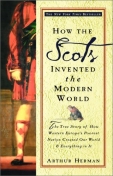BKMT READING GUIDES
How the Scots Invented the Modern World: The True Story of How Western Europe's Poorest Nation Created Our World & Everything in It
by Arthur Herman
Paperback : 480 pages
1 club reading this now
0 members have read this book
Introduction
Who formed the first literate society? Who invented our modern ideas of democracy and free market capitalism? The Scots. As historian and author Arthur Herman reveals, in the eighteenth and nineteenth centuries Scotland made crucial contributions to science, philosophy, literature, education, medicine, commerce, and politics—contributions that have formed and nurtured the modern West ever since. This book is not just about Scotland: it is an exciting account of the origins of the modern world. No one who takes this incredible historical trek will ever view the Scots—or the modern West—in the same way again.
Editorial Review
"I am a Scotsman," Sir Walter Scott famously wrote, "therefore I had to fight my way into the world." So did any number of his compatriots over a period of just a few centuries, leaving their native country and traveling to every continent, carving out livelihoods and bringing ideas of freedom, self-reliance, moral discipline, and technological mastery with them, among other key assumptions of what historian Arthur Herman calls the "Scottish mentality."It is only natural, Herman suggests, that a country that once ranked among Europe's poorest, if most literate, would prize the ideal of progress, measured "by how far we have come from where we once were." Forged in the Scottish Enlightenment, that ideal would inform the political theories of Francis Hutcheson, Adam Smith, and David Hume, and other Scottish thinkers who viewed "man as a product of history," and whose collective enterprise involved "nothing less than a massive reordering of human knowledge" (yielding, among other things, the Encyclopaedia Britannica, first published in Edinburgh in 1768, and the Declaration of Independence, published in Philadelphia just a few years later). On a more immediately practical front, but no less bound to that notion of progress, Scotland also fielded inventors, warriors, administrators, and diplomats such as Alexander Graham Bell, Andrew Carnegie, Simon MacTavish, and Charles James Napier, who created empires and great fortunes, extending Scotland's reach into every corner of the world.
Herman examines the lives and work of these and many more eminent Scots, capably defending his thesis and arguing, with both skill and good cheer, that the Scots "have by and large made the world a better place rather than a worse place." --Gregory McNamee
Discussion Questions
No discussion questions at this time.Book Club Recommendations
Recommended to book clubs by 0 of 0 members.
Book Club HQ to over 90,000+ book clubs and ready to welcome yours.
Get free weekly updates on top club picks, book giveaways, author events and more








